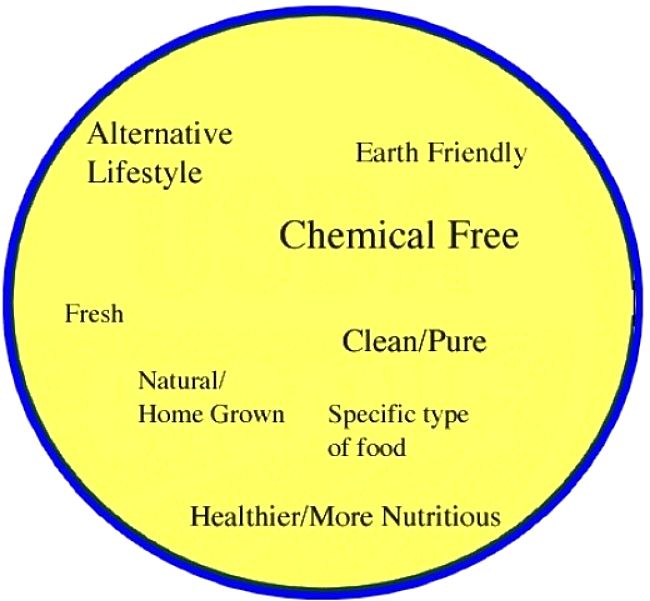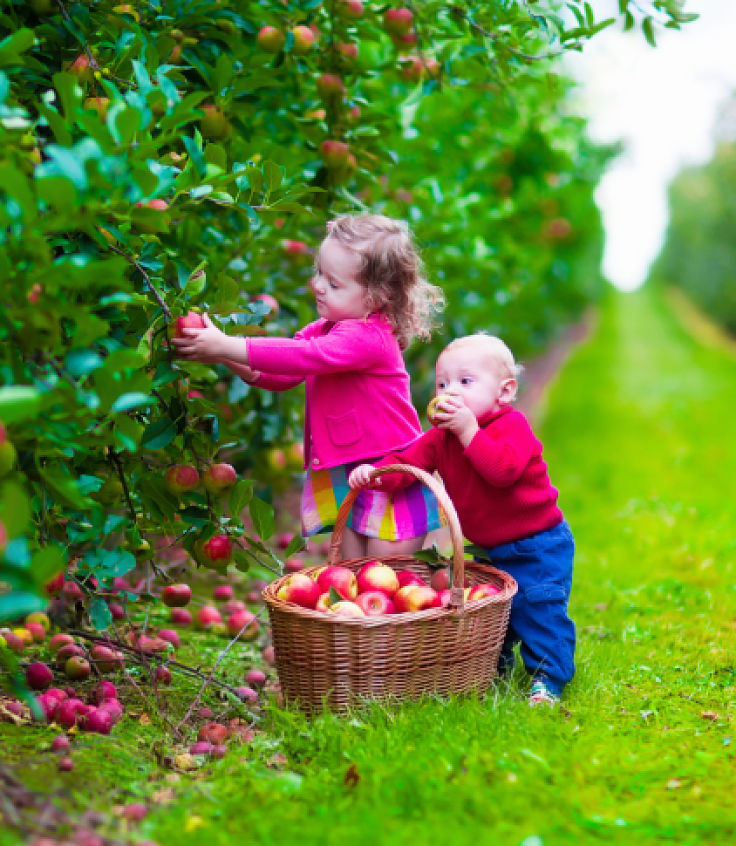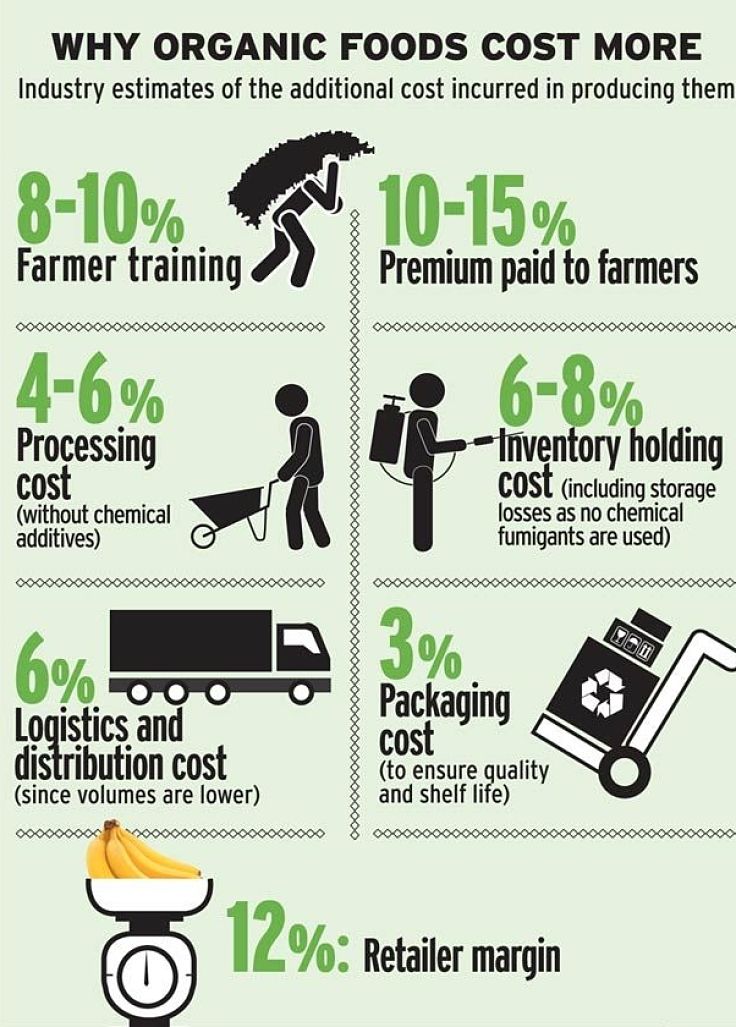Organic Food Health Benefits Worth the Extra Cost?
In times of economic uncertainty its time for a realistic cost benefit analysis of organic foods. Its fine to get that warm inner glow by doing the right thing for the land, the farmers and the environment. But what are the real benefits in terms of nutritional benefits and the avoidance of chemical contaminants such as pesticides and artificial fertilisers. How much extra would you pay for organic produce to get these benefits? The odd thing is that you are mostly paying for the absences - no chemical fertilisers and no pesticides.
Most people are confused about the real benefits. It is relatively easy to assure yourself that organic farming is better for the environment, but the jury appears to be still out on the health benefits especially in terms of nutrient and anti-oxidants. There are so many articles for and against such claims and not many conclusions. Many claim the benefits are exaggerated as the contaminant levels are minuscule. Is it worth paying more for this?

What's the difference?
Organic food - The UN and WHO define organic agriculture as a holistic system that increases agro-ecosystem health, including biological cycles, biodiversity and soil biological activity.
The use of artificial chemicals, pesticides and fertilisers are banned or highly restricted. GM materials are not allowed. Farms must show they comply before they are issued with a certificate. Farms are generally inspected once a year to ensure they remain compliant.
Non-organic food - Farmers can use a wide range of chemicals to help control weeds, pests and fungus, and a wide range of artificial fertilisers to boost yields.
A tomato, for example, may be treated with more than 10 types of chemicals before being harvested.
Many of these chemicals that are applied during ripening are extremely toxic - but there is a withholding period before harvest.
What pesticides are allowed to be used?
Organic food - under EU regulations and other regulations throughout the world specify that very few pest-control substances can be used. The ones that are allowed include sulphur, soft soap, copper, and derris dust (a natural insecticide derived from a root).
Generally only two types - soft soap and sulphur - can be used without express permission.
Non-organic food - Throughout the world nearly 300 substances are approved for use as pesticides and pest control. Apart from general approvals for the substances to be sold and used, these chemicals can be used without any controls.
How much pesticide contaminants remains in and on the foods?
Organic food - Generally organic foods are completely free of pesticide residues,except for race amounts blown in from neighboring farms.
Non-organic food - Recent testing of nearly 1000 non-organic food samples tested, nearly 25% were found to contain pesticide contaminants. This generally includes all breads, butter, onions, tomatoes, green beans, onions, rice and tea. Generally the amounts found are very small, and according to authorities are well below the threshold limit that causes harm. There is endless debate about this and lots or research studies claiming various effects of these contaminants.

Regional Snapsnot of the Most Likely Buys of Functional Foods In Europe
- One in four Europeans buy organic milk regularly
- 12% of Belgians and Portuguese buy soy milk regularly
- 26% of Irish buy milk with added supplements / vitamins regularly
- Denmark tops regional ranking with 45% buying organic milk regularly
- 38% of Belgians regularly purchase cholesterol reducing oils and margarines
- About 44% of Austrians and Portuguese buy Organic fruit and vegetables regularly
- 42% of Irish consumers regularly buy yogurts with acidophilus cultures/probiotics
- Over 60% of Danish and Swedish consumers buy whole grain, high fibre products regularly
- One in four (25%) Germans and Austrians buy fruit juices with added supplements regularly
- Organic tea is currently one of the least popular organic categories, with 43% of Europeans saying they “never” purchase organic tea
Which Food Items are the Worst in Term of Contaminants?
Various test have shown that some food are much worse than others. Perhaps you could save money by selectively buying organic foods as substitutes for the most risky food items A study by the Environmental Working Group of 43 fruits and vegetables shows that you can reduce your pesticide exposure from produce by up to 90 percent by avoiding the 12 most contaminated fruits and vegetables and eating the least contaminated instead. If you have young children, a very high priority could be organic milk. A summary of these recommendations is shown below.

Are Organic Foods Healthier or not?
A systematic review of a vast array of publications over a 50 year periodsummarises the current information on the differences between organic and non-organic foods.
- Non-organic crops had a significantly higher content of nitrogen, and organically produced crops had a significantly higher content of phosphorus and higher were slightly more acidic acidity.
- No evidence of a difference was detected for the remaining 8 of 11 crop nutrient categories analyzed: Nitrogen, Vitamin C, Phenolic compounds, Magnesium, Calcium, Potassium, Zinc, Total soluble solids, Copper.
- Analysis of livestock products found no evidence of a difference in nutrient content between organically and conventionally produced livestock products.
This study concluded that on the weight of evidence there is no evidence of a difference in nutrients between organic and non-organic foodstuffs. The small differences in nutrients found were probably due to the differences in the ways the foods were produced, such as the use of natural fertilisers and higher soil carbon levels.
A recent study funded by Britain's Food Standards Agency made similar claims there is no nutritional difference between organics and conventionally grown produce.
On the other hand the The French Agency for Food Safety recently confirmed that organic foods contain more antioxidants, more heart-healthy polyunsaturated fatty acids, iron, and magnesium than non-organic foods. Another five-year study by research centers, funded by the European Commission found that organic produce such as cabbage and potatoes contained more vitamin C; organic tomatoes contained more nutrients overall; and that organic dairy foods contained more omega-3 fatty acids. This study also found organic foods had lower levels of contaminants such as heavy metals, mycotoxins (by-products of fungal infections), and pesticide residues.
So the information on the potential benefits of organic foods based on detectable differences in chemical analysis of foods is contentious and contradictory
So is it worthwhile buying organic food? Its your decision. But how much are you willing to pay?
Given the choice between two apples with the same outward appearance, would you be willing to pick the one that's 50% more just because it's labeled organic? For most people, the 30% price increase for an apple can add up to a lot of money over time, and going organic can seem a pricey venture.
The results of a Study in Denmark, designed to find out how much consumers were willing to pay for different types of organic food is shown below:
- About 50-60% or people were willing to pay more for organic food, with the highest rate applying to organic milk.
- Most people were willing to pay up to 50% more for organic milk and potatoes.
- Most people were only willing to pay up to 25% more for organic Ryebread and Minced Beef

Ways to Reduce the costs of Organic Foods
Target foods that have the highest contaminant levels for non-organic foods ( see the Table above). Focus on replacing the foods known to have the highest potential contaminants because of high levels of pesticide use during non-organic production.
Shop at farmers' markets - Your local Farmers Markets or Fruit Markets are great sources of fresh local produce, often at very good prices. However you need to check on whether the claims of the stall holders are bone fide. Beware many of them use pesticides.
Is Organic Food always the Best choice for the Environmentally? - The answer is no! - if the organic food is not fresh, nor grown locally. The cost of refrigeration and transport may outweigh the benefits. Look for food that is both locally grown and organic.
Join a co-op - Food cooperatives provides food products, groceries, consumer goods and various other products their members at a discount and many specialise in organic food.
Join a Buying Group - A buying group is a great way to get the organic food cheaply by buying in bulk directly from the producer. Buying-club members join together to purchase organic food and other organic products in bulk and then distribute the produce.
Buy in bulk - Buying in bulk is a great way to reduce costs, even in supermarkets. You can save on costs and on storage space by combining with your friends.
Buy up big In-season and Freeze or Preserve - The produce is at its best at the peak growing season. Freeze and preserve the produce for later use.
Grow your own - If you want cheap garden-fresh organic produce, why not grow your own?
Shop Around and Online - Do some research on prices offered by you local suppliers, and go online to find cheap deals.




